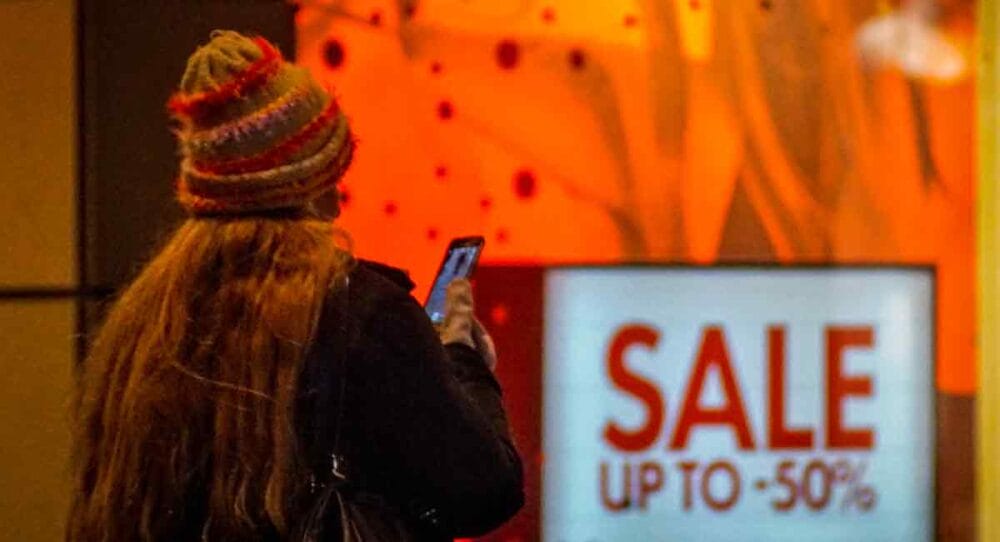Contrary to some forecasts that suggest a tough road ahead for retailers due to consumer frugality, global shoppers are poised to either maintain or elevate their spending across both online and physical stores this Black Friday Cyber Monday (BFCM) weekend. Notably, they are on the hunt for specific deals and are increasingly relying on Artificial Intelligence to discover new brands and products. They are also open to brand-switching to secure these deals.
This insight comes from Shopify’s Black Friday Cyber Monday 2023 Report, which surveyed over 2,000 consumers and 1,000 small and medium-sized businesses (SMBs) in the UK. The report is part of a broader study that includes data from 12,000 consumers and nearly 5,000 businesses across six countries.

Deann Evans, Managing Director, EMEA at Shopify, stated: “Despite many studies predicting a challenging period for retailers as consumers look to tighten their purse strings, our data indicates that this could be a key revenue moment for those that embrace BFCM. In fact, shoppers have recently cut back so they are ready to spend during BFCM to get more for their money. Brands need to embrace this opportunity by offering competitive deals and higher quality products as if they don’t, consumers may move away to another.”
🏆
The 2024 Creative Retail Awards are open for entries.
The Creative Retail Awards are much more than a mere accolade; they represent the pinnacle of achievement in the retail industry. Garnering a nomination or winning one of these awards is a testament to innovation, excellence, and leadership.
www.creativeretailawards.com
Consumer Spending: A Closer Look
While 73% of global consumers and 74% in the UK have curtailed their discretionary spending recently, over half (53%) of UK shoppers have been saving more each month than in previous years. This frugality is translating into a willingness to spend during peak sales events like BFCM, with 69% more likely to shop during this period. Specifically, 66% of UK consumers, and 67% globally, anticipate spending as much or more this BFCM compared to the previous year.
UK shoppers are also becoming more discerning, with 83% planning to compare prices to secure the best deals. Cost is a significant factor for 68% when considering switching brands, but 77% also emphasize the importance of product quality.
Gareth Newman, CEO and Founder of Blakely, a UK-based clothing retailer, remarks: “BFCM is a competitive time, and we find that a fast-paced, reactive approach drives sales. Sometimes that means putting on the right sale at the right time, or using a sale to draw in people who haven’t shopped with us before but are sitting at the top of the conversion funnel and making sure we give them a reason to return. That’s one example of where linking up our in-store and online offer is really powerful: someone might wander into our store and buy in a sale, and if they opt in to hearing more from us we can create personalised rewards or an incentive to shop with us again.”
The Rise of Omni-Channel Retail
Despite the digital age, in-store shopping remains popular, with 33% of UK consumers preferring it over online browsing (39%). Moreover, 76% of UK retailers, and 81% globally, believe physical stores are as or more important than last year, an increase from 68% in 2022.
Social media platforms are also becoming a viable shopping avenue. About 35% of UK consumers are willing to make purchases directly on Instagram, a crucial point as 80% of UK retailers view social media as equally or more important than last year for sales.
Gareth Newman adds: “We see online and bricks-and-mortar as essential partners allowing us to create omni-channel experiences for our customers. We started out as a solely ecommerce business, but by adding physical stores we were able to carve out a completely new sales channel, where new customers could find us accidentally and existing ones can have an immersive Blakely experience. By linking the two we’re already seeing added value: we’re converting in-store customers, online, and vice versa.”
Technology as a Sales Catalyst
In the UK, 40% of shoppers are more likely to patronize brands that integrate technology into their shopping experience. Self-service checkouts are the most favored technology, liked by 53% of consumers, followed by real-time order tracking (38%) and mobile apps (44%). Additionally, 38% use technology to secure the best value for money, 34% for convenience, and 26% to make informed decisions.
AI is becoming increasingly important, with 68% of UK consumers believing it will simplify the discovery of new brands and products. Brands are taking note, with 67% investing more in technology to capitalize on BFCM and other peak sales periods.














